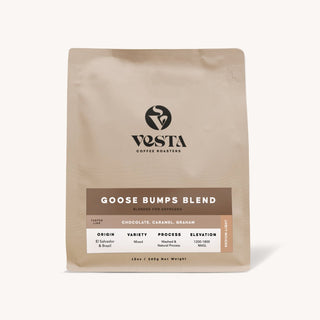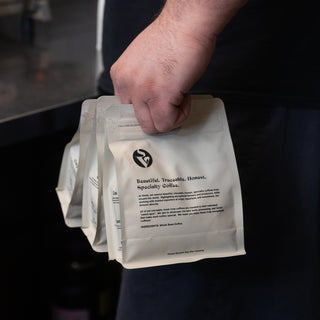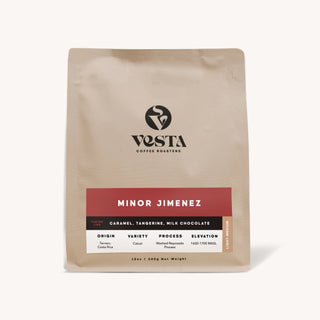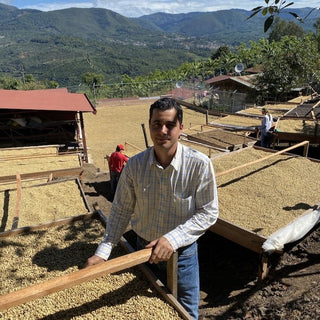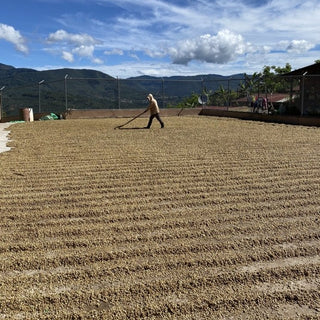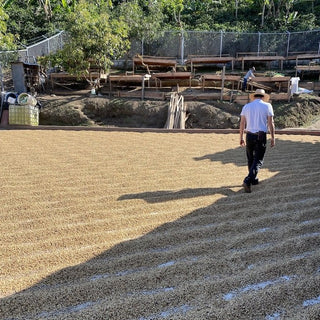Origin: Costa Rica
Region: Tarrazu
Farm: La Cumbre
Variety: Catuai, Caturra
Altitude: 1650masl
Processing: Washed Reposado Process
Minor Jimenez - Washed Catuai
Tasting Notes: Caramel, Tangerine, Milk Chocolate
This is the first washed lot coffee we have purchased from Minor. His meticulous attention to detail and cleanliness in the mill make him a prime candidate to produce high-quality washed coffees. Much of Costa Rica went to processing honey and naturals for the obvious ease, water-savings, and perceived cup scores. But we firmly believe that the higher/moderate elevations can still produce beautiful washed, clean specialty coffees. So much so, that we have already committed to future washed lots of his, and will be working together for something special next year!
La Esmeralda is one of Minor’s most prized lots and his first choice to process fruit from the plantations his family has to choose from. This particular plantation is located just to the north of the family’s residence in the town of San Lorenzo de Tarrazu. This has been a long known high quality producing area for coffee growing in the area due to its drier climate as it is more exposed to the sun. Since the family has been growing large amounts of coffee for so long they really know how to manage their plantations. The most important thing is to work in harmony with the surroundings and focus on quality.
Producer History: Minor Jimenez comes from a serious coffee producing background. His family has been growing coffee as a cash crop for generations, he is the 4th generation of farmers. While the family has a history of managing their plantations with the utmost care and environmental awareness; their focus has always been in high volumes. Over the years they were able to acquire quite an impressive land mass in order to make coffee production profitable. In the past the family would deliver all of their cherries to local cooperatives and large neighboring wet mills. Prices for coffee cherries are quite low and have gone lower and lower over time; which means that farmers need to create large quantities or somehow add value to their finished product. As a young man passionate about coffee and starting a family, Minor needed to make his own way in the coffee industry. He and his wife Nancy decided to pursue their dreams and add value to their coffee by processing, roasting, and selling it themselves. In 2014 Cafe La Cumbre was born with the mission to represent their family, community, environment, quality products, consistency, and transparency.
The farm which Minor and Nancy utilize for their “Cafe La Cumbre” project is named La Esmeralda which is still owned by Minor’s father, Omar Jimenez Marin. Omar, along with his wife Ana Maria and son, Minor, have fostered a system at La Esmeralda over the years which is capable of producing the highest quality of coffee while also positively impacting their community, environment, and economy. It is worth noting that this producing family is very connected with their workers. They employee a good amount of farm hands year ‘round and host the same migrant worker families every season. The working conditions and benefits La Cumbre has created for its employees over time is extraordinary and is one of the things that impresses us most about the project.
Processing: This coffee is washed and then rested in tile fermentation tanks for 72hrs, al a reposado.
Drying: Minor now uses a combination of patio, raised bed, and mechanical dryer. Starting on patio/bed and then moving to mechanical. Drying in this manner helps to work with the ebbs and flows of harvest, but also helps him get very specific on how the coffees are dried.
More Info: Read about our Trip to Costa Rica to visit Minor and learn more about what makes his coffees special.
Tasting Notes: Caramel, Tangerine, Milk Chocolate
This is the first washed lot coffee we have purchased from Minor. His meticulous attention to detail and cleanliness in the mill make him a prime candidate to produce high-quality washed coffees. Much of Costa Rica went to processing honey and naturals for the obvious ease, water-savings, and perceived cup scores. But we firmly believe that the higher/moderate elevations can still produce beautiful washed, clean specialty coffees. So much so, that we have already committed to future washed lots of his, and will be working together for something special next year!
La Esmeralda is one of Minor’s most prized lots and his first choice to process fruit from the plantations his family has to choose from. This particular plantation is located just to the north of the family’s residence in the town of San Lorenzo de Tarrazu. This has been a long known high quality producing area for coffee growing in the area due to its drier climate as it is more exposed to the sun. Since the family has been growing large amounts of coffee for so long they really know how to manage their plantations. The most important thing is to work in harmony with the surroundings and focus on quality.
Producer History: Minor Jimenez comes from a serious coffee producing background. His family has been growing coffee as a cash crop for generations, he is the 4th generation of farmers. While the family has a history of managing their plantations with the utmost care and environmental awareness; their focus has always been in high volumes. Over the years they were able to acquire quite an impressive land mass in order to make coffee production profitable. In the past the family would deliver all of their cherries to local cooperatives and large neighboring wet mills. Prices for coffee cherries are quite low and have gone lower and lower over time; which means that farmers need to create large quantities or somehow add value to their finished product. As a young man passionate about coffee and starting a family, Minor needed to make his own way in the coffee industry. He and his wife Nancy decided to pursue their dreams and add value to their coffee by processing, roasting, and selling it themselves. In 2014 Cafe La Cumbre was born with the mission to represent their family, community, environment, quality products, consistency, and transparency.
The farm which Minor and Nancy utilize for their “Cafe La Cumbre” project is named La Esmeralda which is still owned by Minor’s father, Omar Jimenez Marin. Omar, along with his wife Ana Maria and son, Minor, have fostered a system at La Esmeralda over the years which is capable of producing the highest quality of coffee while also positively impacting their community, environment, and economy. It is worth noting that this producing family is very connected with their workers. They employee a good amount of farm hands year ‘round and host the same migrant worker families every season. The working conditions and benefits La Cumbre has created for its employees over time is extraordinary and is one of the things that impresses us most about the project.
Processing: This coffee is washed and then rested in tile fermentation tanks for 72hrs, al a reposado.
Drying: Minor now uses a combination of patio, raised bed, and mechanical dryer. Starting on patio/bed and then moving to mechanical. Drying in this manner helps to work with the ebbs and flows of harvest, but also helps him get very specific on how the coffees are dried.
More Info: Read about our Trip to Costa Rica to visit Minor and learn more about what makes his coffees special.
Origin: Costa Rica
Region: Tarrazu
Farm: La Cumbre
Variety: Catuai, Caturra
Altitude: 1650masl
Processing: Washed Reposado Process
Sourced & Roasted With Intention
We individually profile and roast each coffee to their specific sweet-spot
Sourcing & Selection
Vesta direct sources 90% of our coffees directly from farmers and coops at origin. And uses trusted export partners for the remaining coffees.
All coffees are selected based on taste profiles. We believe that origin, processing and terroir all play a part to make each coffee unique.
Maintaining Relationships
You will notice that many of our coffees are available for multiple years. We are proud (and thankful) to be able to work with many of the same farmers year-after-year. Many times purchasing the farmers entire harvest. Helping the producer have some economic stability, and helping us with a consistent product year after year.

